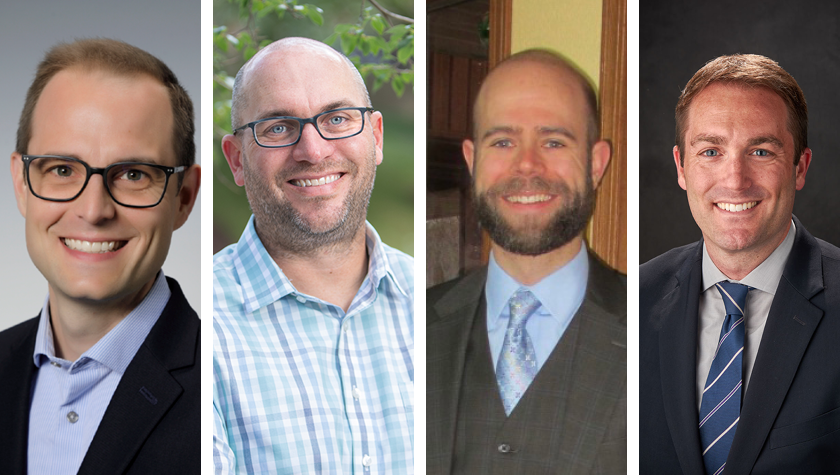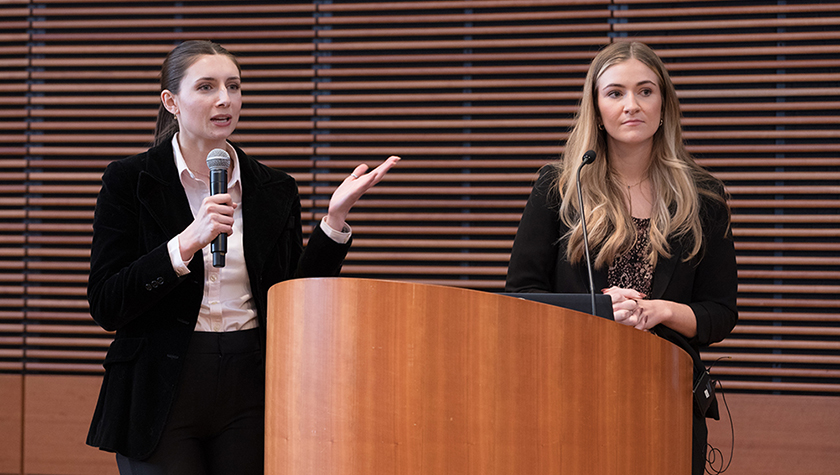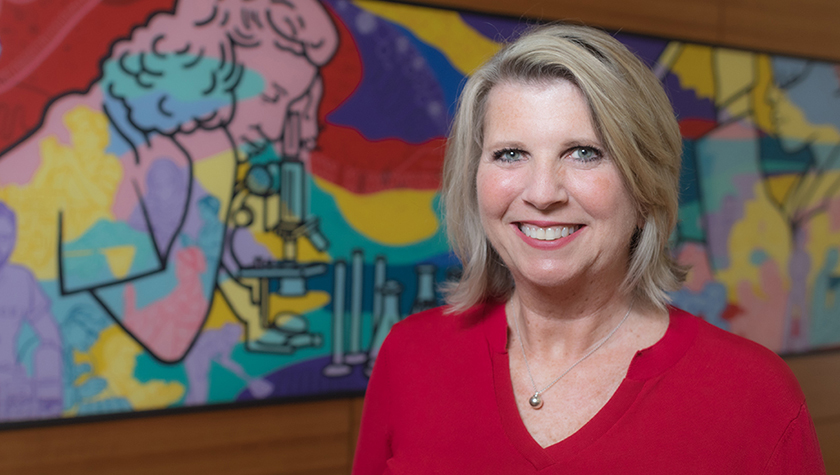
Alum Debra Fluno (BS ‘87), a leader at Cardinal Health, forges her own path in leadership
By Katie Ginder-Vogel
After graduating from the University of Wisconsin–Madison School of Pharmacy and earning her PharmD from the University of Minnesota, Debra Fluno (BS ‘87) decided to complete a PGY-1 residency at Abbott Northwestern Hospital in Minneapolis. The experience was more intense than she’d anticipated, which wound up being a bellwether for her future career.
“A month and a half into my residency, all the residency preceptors left to work for UnitedHealth Group, which was starting their PBM [pharmacy benefits management] business,” recalls Fluno. “It left me and one other clinical pharmacist to handle clinical services for the whole 800-bed hospital.”
Fluno approached the situation calmly.
“It didn’t even occur to me to freak out and move somewhere else,” she says. “I just figured I’d get a different experience than I’d planned on initially.”
That approach — an openness to new challenges — has since helped her continue to advance her career. Today, she’s the national director of pharmacy operations and support services for Cardinal Health.
“All of this stuff is hard while you’re going through it, but you’ll draw on these experiences,” says Fluno, who was the School’s 2023 Hooding Ceremony keynote speaker. “Even if it doesn’t feel good in the moment, I promise you, the good and the bad are all experiences you can leverage. Be open to your career path and the challenges that come your way.”
Finding pharmacy
The idea to pursue pharmacy originally came from Fluno’s aunt, who said it could be a good path since Fluno already enjoyed math and science. A member of a large Badger family, Fluno did not always know she would go to UW–Madison. But one campus visit and a football game at Camp Randall was all it took to set her on her path. It was a natural fit.
As a pharmacy student at the School, Fluno gravitated toward the diagnoses and therapies for different disease states. She was fascinated by her therapeutics classes and thought about going to medical school after graduation. During her hospital rotation in the cardiovascular intensive care unit at UW Hospital, Fluno was part of the healthcare team and went on patient rounds with the other care providers.
“Your failures make you stronger, humble, and more resilient, and sometimes they take you down a path you would have never thought you would go down, but you end up better because of it.”
—Debra Fluno
“I loved it,” she recalls.
The experience helped her decide to pursue a PharmD, which UW–Madison hadn’t yet launched, at the University of Minnesota. After earning her PharmD, Fluno entered the residency that would test her mettle and forge her independence, as she and her preceptor shared clinical services responsibility for the whole 800-bed hospital.
“All of the aminoglycoside and vancomycin dosing and monitoring was done by pharmacy, we had to carry the pager 24/7 and respond to calls for new starts, as well as work with the students during the day on all of the monitoring and chart notes,” she says. “We also did all of the TPN (total parenteral nutrition) consults the same way, so every other week, we’d be on call 24/7.”
The residency also gave her the perspective, or mantra of sorts, that she still has taped to her computer monitor: “Think of this as development, and you will appreciate this experience in the future.”
Embracing new challenges
Fluno’s ability to work independently and set her own direction continued to serve her well as her career progressed. Her first professional role was as a clinical assistant professor at the University of Illinois at Chicago (UIC). When offered a choice between assuming an established clinical pharmacy practice site at UIC Hospital and Clinics or the opportunity to help start pharmacy services at Michael Reese Hospital, Fluno picked Michael Reese.
“They had no decentralized pharmacy or clinical pharmacist rounding yet, so we’d be making it up as we went,” Fluno says. “My first day, my boss walked me up to a building and said, ‘There you go,’ and I had to figure it out from there. I’d had to figure out the curveball in my residency, and once you develop that skill set, you don’t even realize it’s shaping your future.”
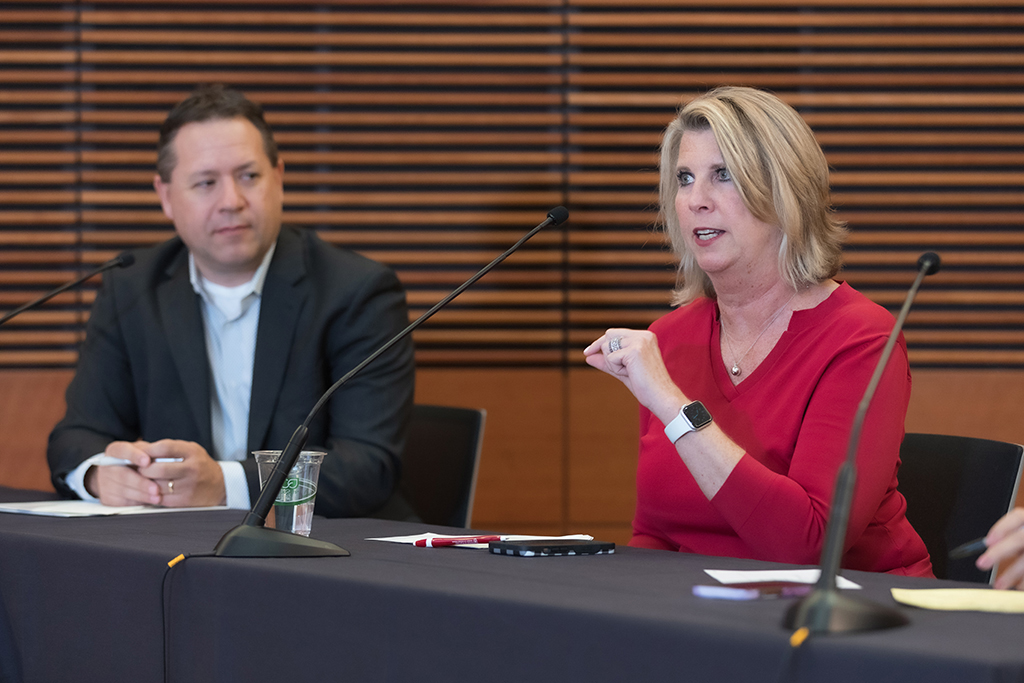
While she was at Michael Reese, the hospital administration brought in Cardinal Health — which serves over 90 percent of hospitals and health systems in the U.S. — to run the pharmacy. But instead of that being an ending for Fluno, it was a beginning.
“It reduced our headcount at Michael Reese, but Cardinal Health recognized the existing talent and offered us a selection of other hospitals to move to,” she says. “I moved to a hospital 10 minutes from my house and was promoted to clinical manager of pharmacy solutions. At first, I was so sad about the change, but it was great in the end.”
Fluno taught general medicine pharmacotherapeutics courses and served as a preceptor for PharmD students and pharmacy residents for six years at UIC. Although she continued to take UIC pharmacy students on clinical rotation until 2002, she left Michael Reese in 1996 to focus on her work with Cardinal Health.
Fluno continued ascending the ladder at Cardinal Health, soon being promoted to system clinical manager, then clinical director of pharmacy solutions, and then regional director of pharmacy operations and account management before landing in her current role, national director of pharmacy operations and support services, where she leads teams that include clinical, quality, accreditation, and medication safety experts. Together, they create resources and best practices for hospital pharmacy operations, such as a pharmacy buyer training program that drives contract compliance, appropriate inventory management, management strategies for drug shortages, and mitigation of expired medications.
Another example of a resource Fluno’s teams have created is a US Pharmacopeia (USP) sterile compounding toolkit with education modules to be compliant with all the standards.
“I have been lucky to work with great leaders who saw potential in me, gave me stretch assignments and roles to help me grow, and supported me as I moved up to different roles in the organization,” Fluno says. “I am most proud of my ability to pay that forward in Cardinal Health.”
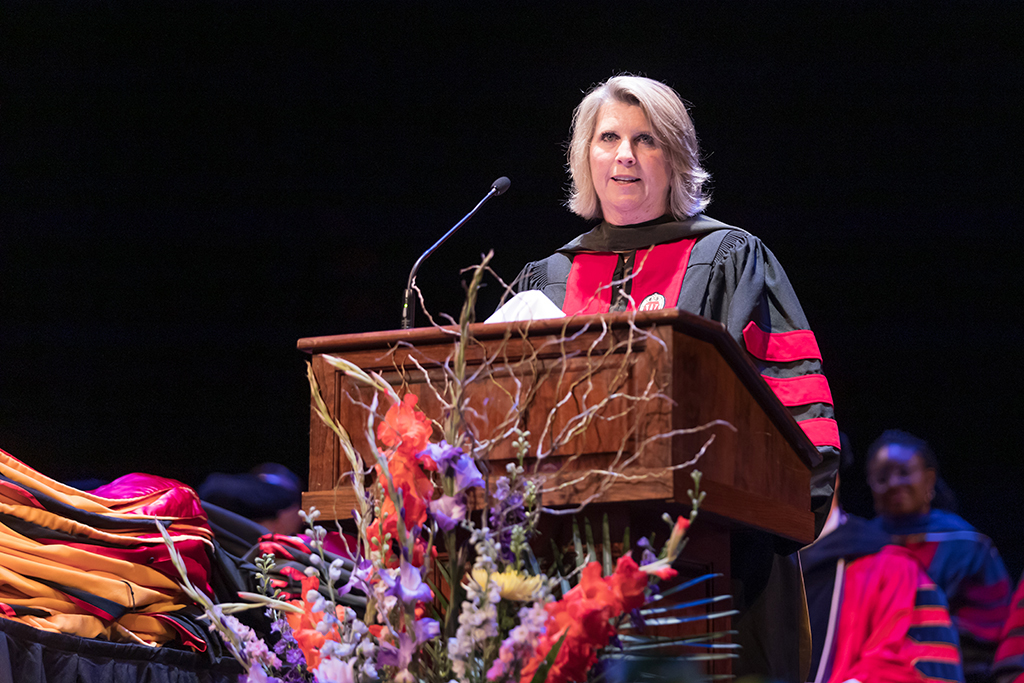
In her three decades with Cardinal Health, she started two ASHP-accredited PGY1 residency programs, served as program director for their manager-in-training and subject matter expert-in-training programs, and mentored and developed countless staff pharmacists, clinical managers, and directors of pharmacy to help them grow their skill sets and move up in the organization.
“I have a passion for unlocking that hidden talent and helping my teams see that they can take on difficult challenges and thrive,” Fluno says.
In her current role, Fluno handles two product lines: a proprietary drug cost analytical software and a clinical program consulting solution.
“Running the data analytics software product, I get exposure to marketing, sales, product lifecycle, IT, and subject matter experts,” she says. “I’ve run patient business units, and I meet with hospital financial and executive officers to convince them to keep Cardinal Health there and show them our value. I wouldn’t have known a job like this even existed as a student.”
Fluno says she serves as a cheerleader for her division and likes to do what she calls “meddling” in other projects.
“I get bored easily, so I tell my boss, ‘I’m meddling,’” she says. “I have a big network of people who can help with various projects, and I love that collaboration. I love learning different things.”
Always a Badger
Fluno maintains an ongoing relationship with the School of Pharmacy as a member of the School’s Board of Visitors (BOV), which is an advisory group to help the School maintain excellence in all facets of training and research, and has supported the Fluno Colter Pharmacy Leadership Scholarship for PharmD students since 2004. In 2023, she also served as a judge for the School’s SHARx Tank, a competition to help entrepreneurial PharmD students hone their ideas, as well as the School’s Hooding Ceremony speaker.
“I value those connections to the School,” Fluno says. “I love representing my area of pharmacy on the Board. We all want the School to be No. 1 and pool our varied experiences and insights to help make that happen.”
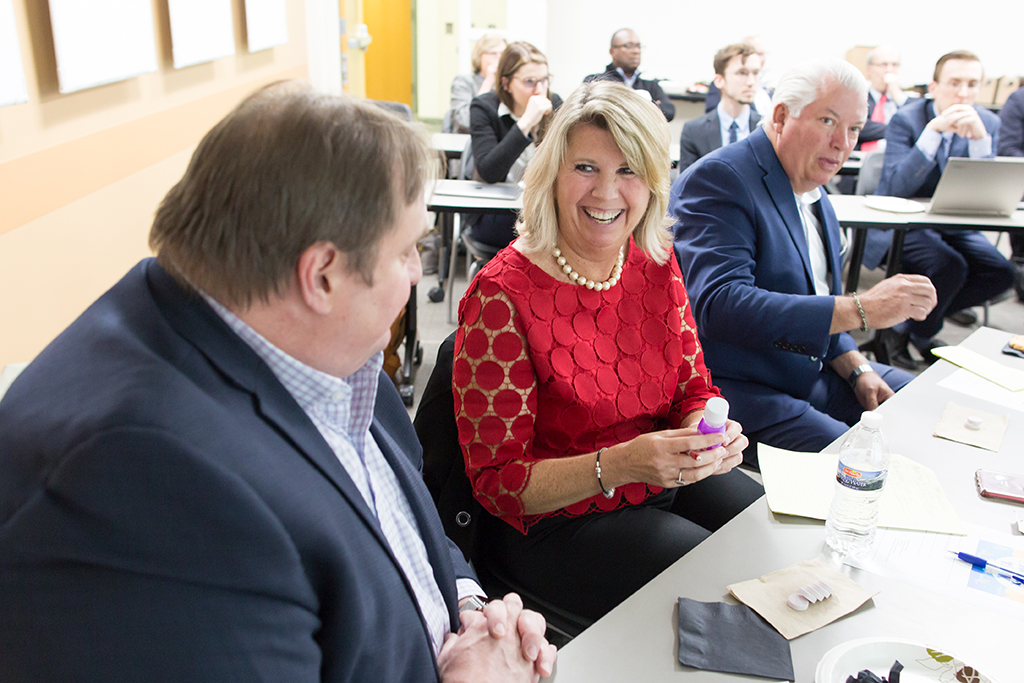
As a member of the BOV, Fluno gets an inside look at the ongoing research programs and new educational initiatives.
“It’s inspiring to get a glimpse into the awesome work the School is doing and think about how, collectively, we can support the School in shaping future generations of pharmacists and pharmacy practice.”
In her remarks to graduating students at the hooding ceremony, Fluno reminded graduates that while aiming for success is important, failures provide big growth opportunities.
“Your failures make you stronger, humble, and more resilient, and sometimes they take you down a path you would have never thought you would go down, but you end up better because of it,” she said.
She challenged students to be willing to ideate creative solutions to solve problems, seeking out diverse viewpoints and backgrounds for collaboration.
“Take your world-class education and experiences from UW–Madison and strive to be a leader, continuously look for opportunities to innovate, and don’t be afraid to fail,” Fluno said. “Measure your success not by your accomplishments, but by the lives of the patients that you touch. The patient is at the end of everything we do, and you each have the ability to make an impact.”
